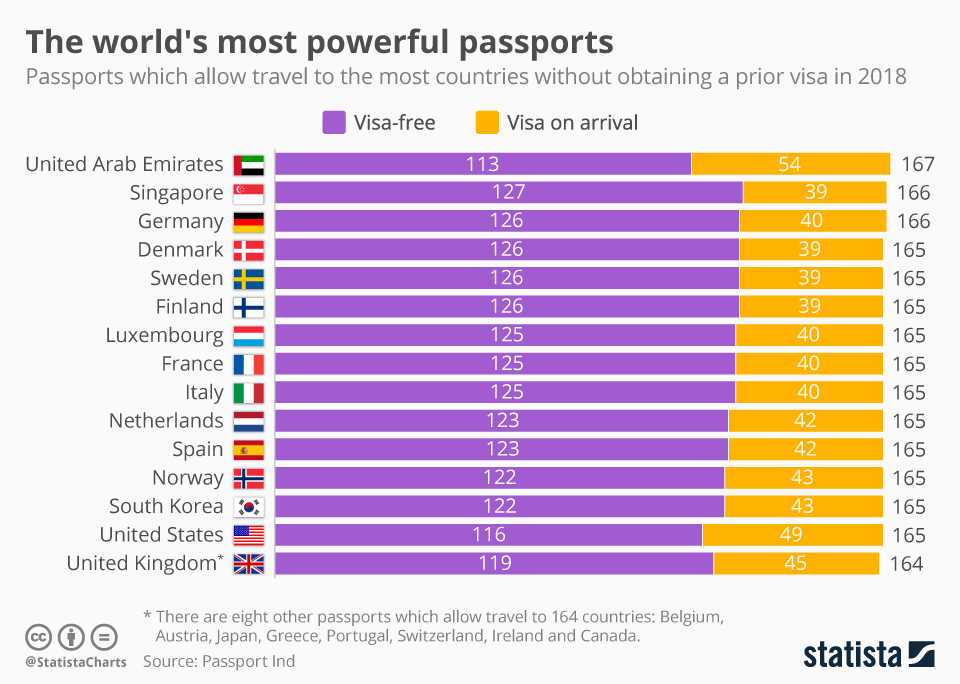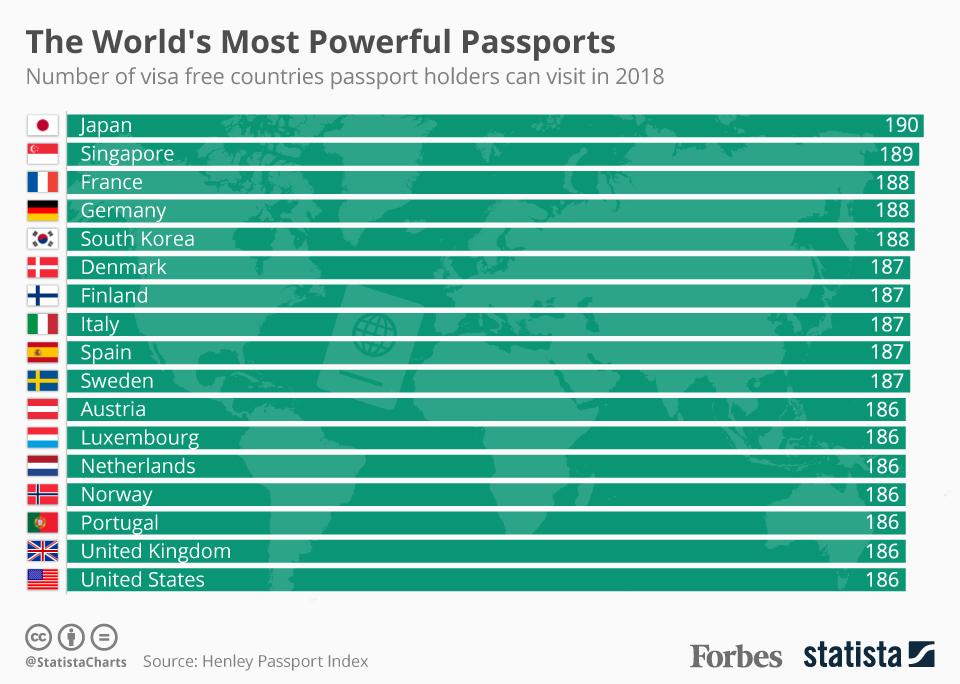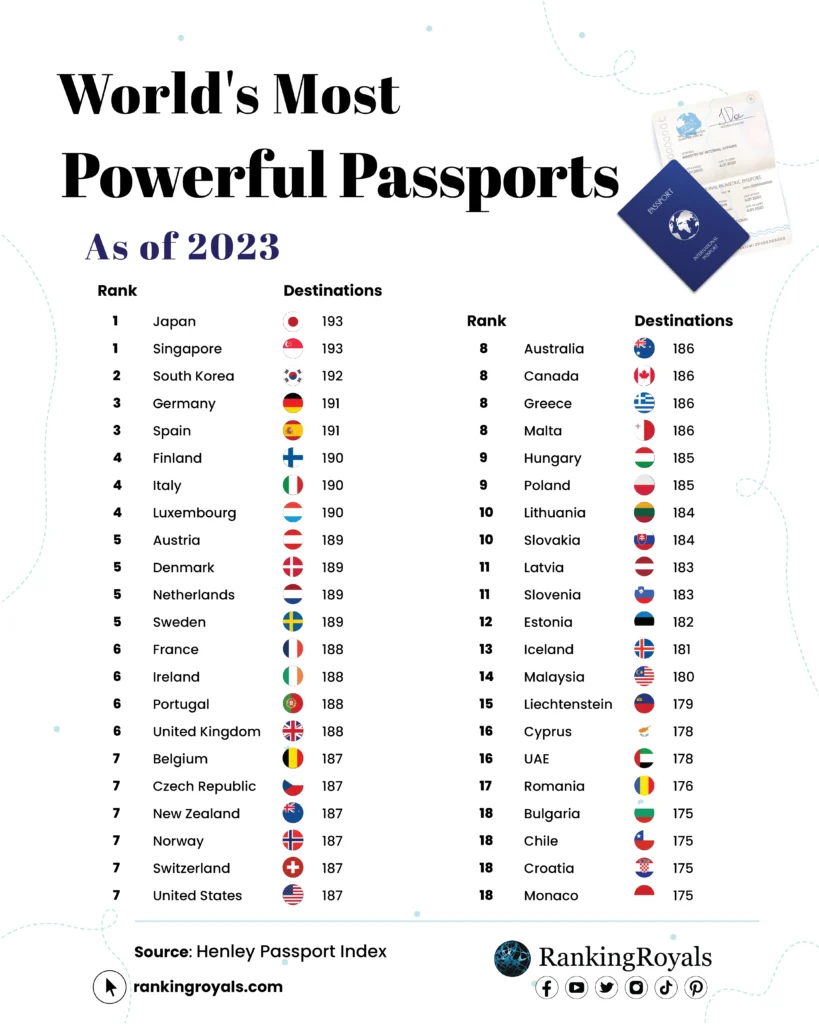Have you ever wondered which passport holds the key to limitless travel possibilities? In the ever-connected world we live in, having a strong passport can open doors to new experiences and adventures. Whether you’re a frequent globetrotter or simply curious about the most influential passports, this article takes a close look at the power behind a travel document and reveals the answer to the burning question: What is the most powerful passport? Journey with us as we explore the fascinating world of passports and discover the passport that grants its holder unprecedented travel freedom.

This image is property of cdn.statcdn.com.
Factors Determining Passport Power
When it comes to determining the power of a passport, several factors come into play. These factors dictate the ease with which you can travel to different countries around the world. Let’s explore these factors in detail:
Visa-free travel
One of the most crucial factors in determining passport power is the number of countries that offer visa-free access to passport holders. Visa-free travel allows you to enter a country without the need for a visa, making travel more convenient and hassle-free. The more countries that offer visa-free access, the more powerful your passport becomes.
Visa-on-arrival
Apart from visa-free travel, another significant factor is the availability of visa-on-arrival facilities. This means that even if a country requires a visa for entry, you can obtain it upon arrival at the destination airport. This feature adds convenience to your travel plans, especially for last-minute trips or spontaneous travel decisions.
Electronic Travel Authorization (ETA)
Electronic Travel Authorization, or ETA, is an electronic system that grants travelers permission to enter a country. This process can be completed online, reducing the need for a physical visa. ETAs are becoming increasingly popular and contribute to the passport power by simplifying the entry process for certain countries.
Passport strength index
The passport strength index is a numerical value assigned to each passport, indicating its overall power and country access. It takes into account factors like visa-free travel, visa-on-arrival, and other entry requirements. The higher the index value, the more powerful the passport is considered to be.
Reciprocity
Reciprocity plays a vital role in determining passport power. It refers to the principle of mutual exchange of privileges between countries. If your home country offers visa-free access or visa-on-arrival facilities to citizens of a particular country, it is likely that citizens of that country can enjoy similar benefits when traveling to your home country. Reciprocity helps create a balanced relationship and influences passport power.
Diplomatic relationships
Another significant factor that contributes to passport power is the diplomatic relationships between countries. Countries with strong diplomatic ties and positive international relations often have more favorable travel arrangements for their citizens. Diplomatic relationships can influence visa policies, visa exemptions, and the ease of travel between nations.
The Henley Passport Index
To evaluate and compare passport power, researchers and organizations have developed various passport indices. One well-known index is the Henley Passport Index, which provides valuable insights into the strength of different passports worldwide.
Explanation of the index
The Henley Passport Index is a global ranking system that measures the travel freedom and visa requirements of different passports. It takes into consideration the number of destinations that a passport holder can travel to without a visa or with visa-on-arrival facilities. The index assigns a score to each passport, allowing for easy comparison and analysis.
Rankings and methodology
The Henley Passport Index releases annual rankings that showcase the power of passports from different countries. The rankings are based on the data gathered regarding visa regulations and access to countries around the world. The methodology considers factors such as visa-free travel, visa-on-arrival, and the overall number of countries accessible to passport holders. These rankings provide valuable insights into the shifting dynamics of passport power over time.
The Most Powerful Passports in the World
Now, let’s delve into some of the most powerful passports in the world according to the latest Henley Passport Index rankings.
Japanese passport
The Japanese passport holds the top spot on the Henley Passport Index, granting its holders visa-free access to an impressive number of countries. Japanese passport holders can travel to over 191 destinations without the need for a visa or with the option of visa-on-arrival.
Singaporean passport
The Singaporean passport secures a strong second position on the Henley Passport Index. It offers visa-free access to numerous countries, enabling Singaporean citizens to explore 190 destinations without visa restrictions.
South Korean passport
The South Korean passport holds a remarkable position, ranking third in the world in terms of passport power. South Korean citizens enjoy visa-free access or visa-on-arrival to an extensive list of countries, totaling 189 destinations.
German passport
The German passport is well-regarded internationally, securing the fourth position on the Henley Passport Index. German passport holders can travel to 188 destinations without visa requirements or with the option of visa-on-arrival.
Italian passport
The Italian passport holds significant global travel power as well, ranking fifth on the Henley Passport Index. Italian citizens can enjoy visa-free access to 187 destinations worldwide.
Finnish passport
The Finnish passport is highly regarded, granting Finnish citizens visa-free access or visa-on-arrival to 186 destinations. It secures the sixth spot on the Henley Passport Index.
Spanish passport
Securing the seventh position on the Henley Passport Index, the Spanish passport provides favorable travel privileges. Spanish citizens can explore 185 destinations without facing visa restrictions.
Luxembourgish passport
The Luxembourgish passport, ranking eighth on the Henley Passport Index, offers its citizens visa-free access to 185 destinations. Luxembourgish passport holders can enjoy seamless travel to various countries around the world.
Austrian passport
The Austrian passport secures a strong position on the Henley Passport Index, holding the ninth spot. Austrian citizens can travel to 185 destinations without visa requirements or with visa-on-arrival facilities.
Danish passport
Lastly, the Danish passport holds the tenth position on the Henley Passport Index, showcasing its passport power. Danish citizens can visit 185 destinations without facing visa restrictions.
The Least Powerful Passports in the World
While some passports enjoy great power and freedom of travel, others face more challenges and restrictions. Here are some of the least powerful passports according to the Henley Passport Index rankings.
Afghan passport
The Afghan passport is considered one of the least powerful passports globally, often facing multiple visa requirements and restrictions. Afghan citizens have limited visa-free access options, making international travel significantly more complicated.
Iraqi passport
The Iraqi passport faces various travel restrictions, limiting the destinations that Iraqi citizens can visit without extensive visa requirements. This reduces the passport’s power and ease of travel.
Syrian passport
Due to ongoing conflicts and geopolitical circumstances, the Syrian passport has minimal global travel power. Syrians often face significant visa restrictions and limited access to other countries.
Somali passport
The Somali passport is among the least powerful passports, with limited visa-free access and extensive visa requirements for global travel. It poses challenges for Somali citizens who wish to explore different destinations.
Pakistani passport
The Pakistani passport faces multiple visa restrictions and limitations, impacting the ease of travel for Pakistani citizens. Obtaining visas for various countries can be a complex process for Pakistani passport holders.
Yemeni passport
The Yemeni passport suffers from restrictions and uncertainty due to political instability and conflicts in Yemen. Yemeni citizens often face difficulties in obtaining visas for international travel.
Libyan passport
The Libyan passport faces limitations and multiple visa requirements, making global travel more challenging for Libyan citizens. Political instability and security concerns have contributed to these restrictions.
Palestinian passport
The Palestinian passport faces limitations and travel restrictions due to political circumstances and conflicts. Palestinian citizens often encounter difficulties in obtaining visas for international travel.
Nepalese passport
The Nepalese passport has limited visa-free access, often requiring extensive visa processes for international travel. Nepalese citizens face challenges in exploring different destinations.
North Korean passport
The North Korean passport is regarded as one of the least powerful passports globally due to international sanctions and political restrictions. North Korean citizens often face extreme limitations on international travel.

This image is property of imageio.forbes.com.
Future Influences on Passport Power
Various factors can influence passport power in the future. Understanding these influences provides insights into how the dynamics of global travel may change over time.
Political and economic changes
Political and economic changes in countries can impact passport power. Shifts in government policies, international relationships, and global economic trends can influence visa regulations and travel privileges for different passports.
Security and immigration concerns
Heightened security and immigration concerns around the world can lead to stricter visa requirements and limitations on passport power. Countries may implement more stringent entry processes to ensure safety and protect their borders.
Global mobility trends
Global mobility trends can also play a significant role in shaping passport power. As certain regions or countries become more popular as travel destinations, passport holders from those regions may experience greater ease of travel and expanded visa-free access.
Technology advancements
Advancements in technology have the potential to revolutionize travel processes and impact passport power. Electronic systems, biometric identification, and digital passports may streamline travel and influence visa requirements and access.
Pandemics and health crises
Pandemics and health crises, as witnessed with the COVID-19 pandemic, can significantly affect passport power. Travel restrictions and health-related entry requirements may become more prevalent in the aftermath of such crises, altering the ease of travel for different passports.
The Correlation between Passport Power and Global Travel
Passport power has significant implications for global travel and its various aspects. Let’s explore the correlation between passport power and key areas of influence.
Impacts on tourism industry
Passport power directly affects the tourism industry, as travelers with more powerful passports have a wider range of destinations to choose from. Countries with touristic appeal often benefit from having more visitors, leading to economic growth and development in tourism-related sectors.
Economic implications
Passport power can influence economic implications on both individual and national levels. Individuals with powerful passports have increased access to international markets, employment opportunities, and potential for economic growth. For countries, strong passport power can attract foreign investors, boost tourism revenues, and facilitate international business partnerships.
Cultural exchange and global connectivity
Strong passport power promotes cultural exchange and global connectivity. Increased travel opportunities allow people from different nations to gain exposure to various cultures, traditions, and perspectives. This leads to greater understanding, tolerance, and cooperation between nations.
Education and employment opportunities
Passport power significantly impacts education and employment opportunities. Students and professionals with powerful passports can explore international study programs, internships, and job opportunities, expanding their horizons and enhancing their skill sets.
International cooperation and diplomacy
Passport power plays a crucial role in international cooperation and diplomacy. Countries with strong passports often have more favorable relationships with other nations, facilitating diplomatic negotiations, trade agreements, and other international collaborations.

This image is property of afar.brightspotcdn.com.
Strategies for Improving Passport Power
Countries and individuals can adopt various strategies to improve passport power, enhancing travel privileges and global access.
Visa-free agreements
Countries can enter into visa-free agreements with one another to expand passport power. Mutually beneficial agreements allow citizens of participating countries to travel to each other’s nations without the need for visas, simplifying travel arrangements.
Economic diplomacy
Enhancing economic diplomacy can contribute to improving passport power. Strengthening trade relationships and engaging in cultural and educational exchanges can lead to more favorable visa policies and increased access to other countries.
Enhanced security measures
Implementing robust security measures can positively impact passport power. Countries that demonstrate commitment to security and border control may enjoy more favorable visa policies and increased trust from other nations.
More robust diplomatic relations
Building and maintaining strong diplomatic relations with other countries can enhance passport power. Fostering positive relationships, engaging in cultural exchanges, and prioritizing mutual interests can influence visa policies and travel privileges.
Investment-based citizenship
Some countries offer investment-based citizenship programs, allowing individuals to obtain a second passport by making significant investments. Acquiring a second citizenship can provide enhanced travel privileges and increased global access.
Dual nationality and second passports
Individuals can explore opportunities for dual nationality or a second passport, which can significantly improve travel freedom and access to different countries with varying visa requirements. Having multiple passports broadens one’s options and flexibility in international travel.
Issues and Controversies surrounding Passport Power
While passport power has its benefits, several issues and controversies surround its concept and implementation.
Inequalities and visa restrictions
Passport power can perpetuate inequalities on a global scale. Citizens of countries with weaker passports face more challenges and restrictions, limiting their opportunities for international travel, education, and employment.
Passports for sale
The practice of selling passports, also known as citizenship-by-investment or economic citizenship programs, is a controversial topic. Critics argue that these programs can lead to misuse and compromise national security, while proponents argue that they can stimulate economic growth.
Political and socio-economic biases
The distribution of passport power may be influenced by political and socio-economic biases. Geopolitical circumstances, economic disparities, and historical factors can impact visa policies and privileges, leading to potential inequities in passport power.
Ethical considerations
Ethical considerations arise when discussing passport power and its implications. Questions of fairness, equality, and consequences for vulnerable populations should be addressed to ensure a more just and inclusive global travel ecosystem.
Individual freedoms and human rights
Passport power can intersect with individual freedoms and human rights. Restricted travel privileges can limit personal freedom of movement and hinder opportunities for individuals to exercise their basic human right to travel and explore.
Security risks and threats
Balancing passport power and security concerns is a continuous challenge. Liberal travel policies can potentially expose countries to security risks, necessitating a careful balance between granting access and maintaining safety.

This image is property of rankingroyals.com.
Conclusion
Passport power is a significant determinant of global mobility, travel opportunities, and international cooperation. Factors such as visa-free travel, reciprocity, and diplomatic relationships play crucial roles in defining the strength of a passport. The Henley Passport Index provides valuable insights into the power dynamics of different passports. While powerful passports offer enhanced travel freedom, the concept also raises ethical considerations and potential inequalities. Strategies for improving passport power include visa-free agreements, economic diplomacy, and enhanced security measures. Understanding the correlation between passport power and global travel is essential for embracing the benefits and addressing the challenges associated with this concept.
Didn't find what you were looking for? Search here
